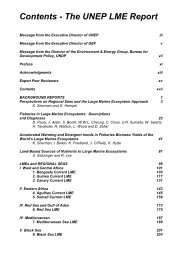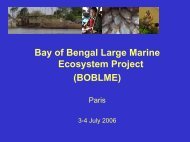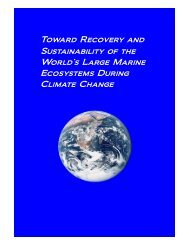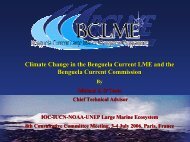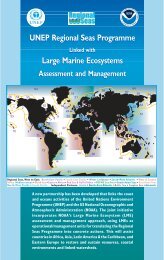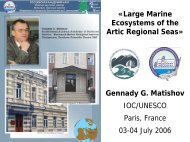Sustaining the World's Large Marine Ecosystems
Sustaining the World's Large Marine Ecosystems
Sustaining the World's Large Marine Ecosystems
Create successful ePaper yourself
Turn your PDF publications into a flip-book with our unique Google optimized e-Paper software.
(BCLME) project serves as a successful model for o<strong>the</strong>r LME projects. Especially<br />
significant were <strong>the</strong> national dialogues fostered in inter-ministerial committees.<br />
They proved to be an important factor in aligning different ministries related to<br />
land and water activities to work in an integrated, ecosystem-based fashion.<br />
This early success led to <strong>the</strong> establishment of <strong>the</strong> new, ecosystem-based,<br />
Benguela Current Commission (BCC). The Commission was an illustration of<br />
how <strong>the</strong> political commitment of 3 countries can secure ecosystem sustainability.<br />
As a result, a second and final GEF LME project was funded to operationalize <strong>the</strong><br />
BCC and support negotiations for a legal agreement among <strong>the</strong> 3 countries to<br />
sustain its work (Duda 2008). The BCC marries <strong>the</strong> advice of science-based<br />
groups with <strong>the</strong> advice of management institutions to improve decision-making in<br />
fisheries, coastal management, mining and energy. With an ever warming and<br />
fluctuating marine environment in which <strong>the</strong> fish stocks move, <strong>the</strong> science-based<br />
advice and forecasting tools are used by GEF supported LME projects to provide<br />
sound recommendations to <strong>the</strong> joint management institutions so that<br />
stakeholders at all levels can adapt to fluctuating and changing climate.<br />
The Danube/Black Sea Basin under <strong>the</strong> GPA<br />
Seventeen countries rely on <strong>the</strong> Danube River Basin including its tributaries and<br />
<strong>the</strong> Black Sea LME project, for economic, social, and environmental services.<br />
These important waters have been degraded by pollution and o<strong>the</strong>r human<br />
influences, and have been over-fertilized by nitrogen and phosphorus from<br />
agricultural, municipal, and industrial sources.<br />
Since 1992, <strong>the</strong> GEF has supported an array of projects aimed at improving<br />
ecosystem quality in <strong>the</strong> region, designed to bring Danube basin and Black Sea<br />
coastal states toge<strong>the</strong>r in <strong>the</strong> TDA and SAP process and in national inter-ministry<br />
committees. In order to fund <strong>the</strong> Strategic Partnership for Nutrient Reduction in<br />
<strong>the</strong> Danube River and Black Sea, <strong>the</strong> World Bank, UNDP, and UNEP mobilized<br />
more than $US 450 million in co-financing that supplemented <strong>the</strong> $US 100 million<br />
from GEF to make policy, legal, and institutional reforms, invest in <strong>the</strong> agriculture,<br />
municipal, and industrial sectors, and restore wetlands to reduce nitrogen<br />
pollution in <strong>the</strong> Black Sea watershed.<br />
The Strategic Partnership of <strong>the</strong> 17 watershed states, <strong>the</strong> GEF, <strong>the</strong> UN agencies,<br />
and donors now brings coordinated support and benefits to <strong>the</strong> Black Sea Basin<br />
under <strong>the</strong> Bucharest and Istanbul Conventions and is taking an adaptive<br />
management approach. The GEF International Waters partnership has served as<br />
a test of whe<strong>the</strong>r a greater and more comprehensive participation of <strong>the</strong> GEF and<br />
a streamlined process for sub-project approvals can leverage significant<br />
environmental improvements in a large, damaged, transboundary <strong>Large</strong> <strong>Marine</strong><br />
Ecosystem (Table 1). The approach has proven successful and is now being<br />
7



